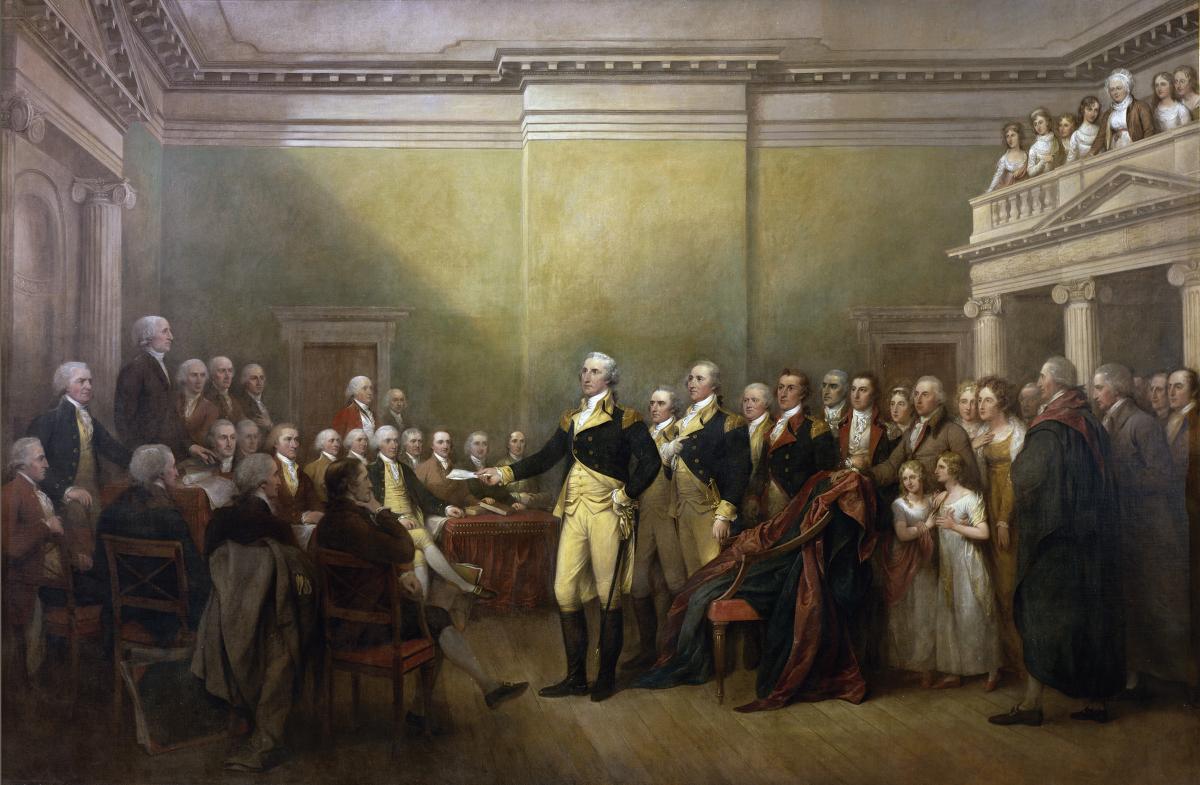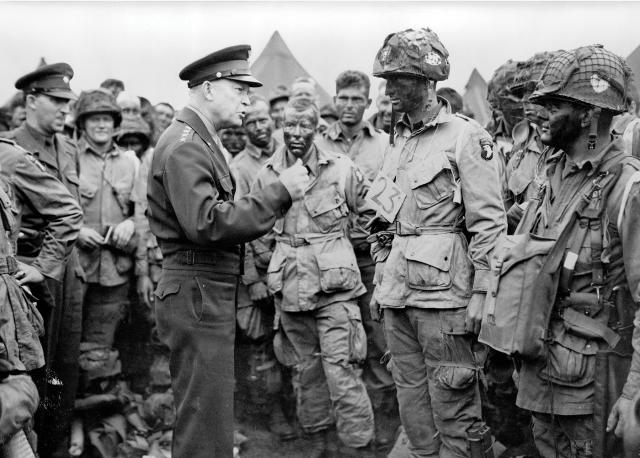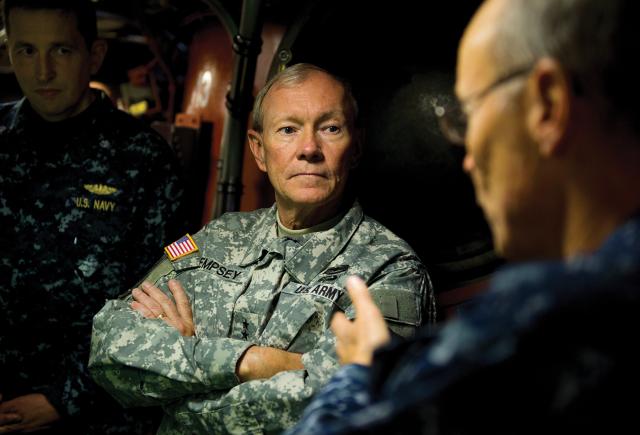Humility is not the first characteristic that comes to mind when conjuring images of history’s greatest military leaders. Legendary leaders from Alexander the Great to Patton, Napoleon to MacArthur, Charlemagne to Halsey are not known for their humble leadership styles, nor might their victories be immediately attributed to anything even remotely resembling humility. History is nonetheless replete with examples of leaders exercising humility to influence their troops and even change the course of human events. Given the fast-changing and unpredictable challenges facing our military today, humility is a necessary quality for leaders to succeed and win.
Often, distorted interpretations of humility undermine the argument that it is an essential leadership quality. Frequently conflated with terms such as modesty or meekness, humility often is imagined as timidity, slowness to act, or even cowardice. After all, many believe, it is not humbleness that achieved victory in the Ardennes Forest or on the islands of the South Pacific.
Humility, however, is more complex than these initial interpretations would suggest. True humility has little, if anything, to do with an individual’s bias for action. Rather, humility is about how one views the world and, specifically, where an individual places him- or herself in relation to others and to external circumstances. A humble person thinks first and foremost about external factors, whether other people, a situation or event, or a larger corporate entity. True humility is characterized by the extent to which one’s decision-making and behavior are influenced by factors apart and distinct from oneself. As Rick Warren put it, “True humility is not thinking less of yourself; it is thinking of yourself less.”1
Think Beyond Yourself
With a more complete understanding of what humility is and, more important, what it is not, it becomes easier to grasp why this quality is so essential to military leadership. Taking decisive action and seizing opportunities by leveraging the decentralization of command has been a seminal tenet of military strategy throughout history. In 2012, then-Chairman of the Joint Chiefs of Staff General Martin Dempsey formally reintroduced this concept into U.S. military strategy. He emphasized that:
to gain and maintain advantageous tempo, our leaders must be able to see, understand and rapidly exploit opportunities in both time and space, guided by their understanding of [commander’s] intent, their mission, environment and the capability of their force.2
Today, the need for decentralized decision-making and initiative is no less critical to military leadership. In his message to the force in October 2019, Secretary of Defense Mark Esper reiterated the importance of mission command, writing that commanders at all levels “must power down decision-making to the lowest capable level whenever possible, and instill a culture of disciplined initiative and prudent risk-taking in their subordinates.”3
Implicit—albeit not obvious—in the doctrine of mission command is the need for commanders and subordinates to act with humility. For senior commanders, being able to trust and empower subordinates demands that they relinquish control and allow others to execute the mission. For junior leaders, humility enables them to see the bigger picture and operationalize a commander’s intent without being hampered by their biases or limitations. As Army General Robert Brown and Colonel Robert Taradash point out, it was humility—exercised at all levels—that secured victory for the Allies and cemented defeat for the Germans on D-Day:
On the Allied side, airborne forces missed drop zones, and amphibious forces landed on the wrong beaches. Yet amidst the chaos, leaders emerged who were able to keep sight of and operationalize Gen. Dwight D. Eisenhower’s vision. On the other side, Adolf Hitler’s forces, arguably better equipped and better organized, were paralyzed to respond to the invasion in the early hours of June 6, 1944, because no one dared wake Hitler to authorize the commitment of much needed armored reserves in Normandy.4
In one of our nation’s most daring and decisive battles of the 20th century, it was Eisenhower’s humility—and Hitler’s complete lack of it—that enabled Allied forces to secure the beaches on D-Day, which marked the beginning of the end of World War II in Europe.
To effectively exercise mission command, leaders at every echelon must be willing to think beyond their individual goals, interests, and welfare. They must, to put it another way, think less of themselves. A leader whose worldview is centered around himself cannot effectively operationalize the vision or intent of higher authorities, nor can he wholeheartedly act in the best interests of external forces. It is not that humble leaders do not care about their own well-being; it is simply that they are able to subordinate those pressures for the greater good when necessary.
At Normandy, General Eisenhower was willing to sacrifice control, authority, and even prestige by empowering and trusting his subordinate commanders to act independently. Hitler, on the other hand, consumed by hubris, inhibited his commanders’ ability to repel the invasion by demanding he be personally involved in tactical decision-making. As General Brown and Colonel Taradash argue:
Humility serves as the catalyst for reducing the risk of friction inherent in command, and it can preserve perspective and self-control, potentially preventing the blind spots and trappings sometimes found in positions of power.5
Stay Morally Grounded
During the early days of this nation, humility quietly prevented disaster. In the wake of victory against Great Britain and with newly earned independence, the nascent U.S. Congress struggled to establish effective governance. Among the many challenges it faced, the federal government was unable to pay the soldiers and officers who had sacrificed so much to beat the far-superior British forces. Growing angry and desperate, many of these officers gathered in Newburgh, New York, in the winter of 1782–83 to discuss overthrowing the new government and establishing a more authoritative and capable regime, not unlike the one from which they had just won independence.
General George Washington was asked to appear before this group of conspirators, with the implication that he would be installed as the new king of America. Recognizing the coup that was about to take place, General Washington responded in one of history’s lesser-known but nonetheless historic acts of humility. As Dr. Joseph Thomas recounts, Washington stood before the large crowd of military officers, all of whom expected and eagerly anticipated his support for their planned coup:
In the process of addressing the assembled officers and promising to appeal to Congress for all that was owed, he slowly pulled a pair of spectacles from his pocket. The room fell deadly quiet, for no one knew the great general required eye glasses. . . . As he fumbled to adjust his glasses he stated apologetically, “Gentlemen, you will permit me to put on my spectacles, for I have not only grown gray but nearly blind in the service of my country.” The Army’s differences with their civilian masters were resolved immediately. Many in the room welled up in tears. A clear, important message had been sent by the nation’s greatest leader—the [military] was the servant protector of the people, and the people were directly represented by the elected officials.6
In a subtle, yet powerful, act of humble leadership, General Washington prevented the American experiment from being extinguished before it even began.
In addition to expanding one’s perspective beyond self, humility has the enduring power to keep leaders grounded and able to sustain their moral courage in spite of the darker pressures often inherent in positions of power and authority. The story of King David is a timeless and oft-cited example of how even the purest can be corrupted by power. As Dean Ludwig and Clinton Longenecker recall, David was “a leader with a humble past, a dramatic rise to power, strong organizational skills, a charismatic personality . . . and a man of high moral character.”7 By all accounts, David was the quintessential leader we would all emulate. At the peak of his power, however, he succumbed to temptation and ignored his moral compass, engaging in an affair with a married woman, Bathsheba; later marrying her after orchestrating her husband’s death.
King David’s ethical failure at the height of his power, despite such an otherwise sterling track record, is a well-studied—and frequently repeated—element of human nature. The “Bathsheba Syndrome” is a condition anyone can encounter. Indeed, as Ludwig and Longenecker warn, “It is not simply the unprincipled and those under competitive pressure who fall victim to ethical violation,” but any leader on whom the benefits of power and privilege have been bestowed.8
The risk of ethical failure grows in relation to one’s success and increased responsibility. As authority and access are granted in greater degrees, it is only natural that a leader may assume, consciously or not, that he or she is somehow above the law. In the face of this “darker side of success,” humility is the only antidote. Only by keeping one’s focus on those external forces—on the needs and requirements of others and of the organization—can a leader have any hope of resisting the abandonment of principles that becomes so tempting.
Considering that someone as virtuous as King David might so easily succumb to the darker side of success, it may seem that no leader can inoculate himself from this danger. That is why humility is so critical, especially as one gains greater rank and authority. Complacency is much to blame for David’s behavior as king. Satisfied with his achievements, he lost focus on the larger, corporate goals whose attainment enabled him to succeed in the first place. His attention turned inward, and he became absorbed in pursuing personal interests and desires, without regard for the people he was leading. “This egocentricity,” Ludwig and Longenecker point out, “can cause the leader to become abrasive, close-minded, disrespectful, and prone to extreme displays of negative emotion, all of which are warning signs along the road to megalomania.”9 Keeping one’s focus consciously and consistently on external goals and on others is not only the mind-set of a humble person, but also necessary for ethical leadership.
Practice Makes Perfect
In practice, staying humble is much easier said than done. In the military, we almost exclusively reward individual performance and achievement. Fitness reports and evaluations are written to highlight—sometimes hyperbolically—how an individual’s personal contribution is invaluable to the command. We frame our worth and value in relation to what we alone can contribute. Given this landscape, exercising humility will no doubt take some effort and perhaps even some creativity.
At Training Squadron 3 (VT-3) on board Naval Air Station Whiting Field, instructor pilots have put forth just such an effort. As one of five primary flight training commands, VT-3 is responsible for training the newest student military aviators in the demanding and unforgiving T-6B “Texan II” aircraft. The cadre of instructors includes Navy, Marine Corps, Air Force, and Coast Guard pilots, from O-3 to O-5, many of whom have thousands of flight hours in multiple military aircraft. Within this experienced group of aviators, an interesting, and largely unprecedented, practice has developed wherein instructors readily share their mistakes, missteps, and errors for all to see.
These “digital true confessions,” taking the form of emails sent to every instructor in the squadron, are candid, honest, and refreshingly self-deprecating recollections of what an instructor pilot did wrong, how it happened, and how the rest of the ready room may prevent the same mistake. In a community sometimes derided for its arrogance, this practice of openly discussing mistakes is a powerful expression of humility. Interestingly, this practice developed on its own and is not codified by any instruction or command directive. It has nonetheless become a point of pride within the squadron and an effective tool for collective self-improvement.
Humility might not occupy the top spot among desired leadership qualities. Regardless, its expression has had a powerful impact in the most trying of situations, from the heat of battle to the halls of public discourse. Furthermore, humility represents the most effective reinforcement for sustaining ethical behavior. By framing one’s focus externally, humility ensures a leader does not succumb to the trappings of his or her power. As Stephen Covey explains:
A humble person is more concerned about what is right than about being right, about acting on good ideas than having the ideas, about embracing new truth than defending outdated position[s], about building the team than exalting self, about recognizing contribution than being recognized for making it.10
As both a means of influence and hedge against unethical behavior, humility is critical in any leader. For military leaders, for whom the stakes are highest, humility can mean the difference between victory and defeat.
1. Cheryl Williamson, “The Importance of Humility in Leadership,” Forbes Coaches Council, 14 September 2017.
2. GEN Martin E. Dempsey, USA, “Mission Command White Paper,” Office of the Chairman of the Joint Chiefs of Staff, 3 April 2012, 4.
3. Hon. Mark Esper, “Message to the Force—Warfighting Readiness,” Office of the Secretary of Defense, 10 October 2019, Washington, DC.
4. GEN Robert B. Brown and COL Robert M Taradash, USA, “Humility: A Mission Command Essential,” Association of the United States Army, 20 April 2015, www.ausa.org/articles/humility-mission-command-essential.
5. Brown and Taradash, “Humility,” 1.
6. Joseph J. Thomas, “Leadership Defuses Insurrection; General George Washington’s Speech at Newburgh,” in Leadership Explored: Lessons in Leadership from Great Works of Literature, Joseph J. Thomas, ed. (Bel Air, MD: Academx Publishing Services, Inc., 2006), 103.
7. Dean C. Ludwig and Clinton O. Longenecker, “The Bathsheba Syndrome: The Ethical Failure of Successful Leaders,” Journal of Business Ethics 12, no. 4 (April 1993): 265–73.
8. Ludwig and Longenecker, “The Bathsheba Syndrome,” 272.
9. Ludwig and Longenecker, 271.
10. Stephen M. R. Covey and Rebecca R. Merrill, The Speed of Trust: The One Thing That Changes Everything (New York: Free Press, 2006), 66.





